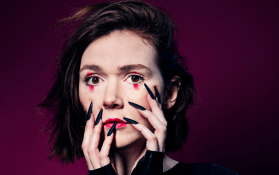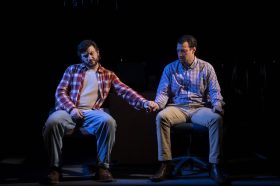Irina Dubrovskaya as Gilda and Warwick Fyfe as Rigoletto. Image by Jeff Busby.
After two decades of service, Elijah Moshinsky’s production of Rigoletto for Opera Australia, set in 1960s Italy, has been superseded with an era-specific production directed by Roger Hodgman.
Although the older production was more effective than the company’s recent Verdi stagings like Macbeth and A Masked Ball, this new Rigoletto harks back to the 1960s as well, not in its visual borrowings but to the era just before the advent of ‘regie’ driven opera production.
Hodgman and his set and costume designers, Richard Roberts and Tracy Grant Lord, have, however, filter the look of sixteenth-century Mantua through a 1960s style; the Duke’s red-clad courtiers look like they have stepped out of have Cinecitta.
Despite these idiosyncracies, it is a very enjoyable production with excellent performances throughout. As the courtiers, David Corcoran, Luke Gabbedy and Samuel Dundas show the wealth of vocal talent in the company. As Sparafucile, Daniel Sumegi is luxury casting, joined by Sian Pendry as an excellent Maddalene, richly voiced and splendidly acted.
Baritone Warwick Fyfe has the makings of a good Rigoletto and, in this production, has developed a very persuasive spin on the endlessly nuanced character.
Fyfe’s jester stands and moves with a physical dignity. In the opening scene, he is sinister – the taunting of Monterone is cruel – but he also projects the same contempt to the entire court.
His is a dignified loser in an uncaring world, like Willy Loman with a hump.
Monterone’s curse causes a snap in his behaviour so the first solo unveils a deeper aspect of his Rigoletto’s character. There is a gasp after he first reflects on the curse, a gasp that becomes a wail of despair when he utters it for the final time at the opera’s end and he nicely brings out all the hidden tenderness with the ensuing scenes with his daughter Gilda.
As Gilda, Dubrovskaya is radiant. ‘Caro nome’ is relatively unadorned but all the more telling for that. In ‘Tutte le feste’, she expertly build up the character’s shame and anguish.
There seems to be an attempt at bringing some responsibility to the Duke’s irresponsible behaviour. Gianluca Terranova’s Duke is almost sympathetic prior to his conquest of Gilda. In the final act he sings ‘La Donna e Mobile’ gracefully and gets more musical leverage out of it than is allowed for his act one solo which is rushed along with everything else. Renato Palumbo tends to take fast speeds and there is a sense of breathlessness in the way the music unfolds until the final act.
Hodgman’s direction is plain and unfussy, quite a relief in an age where a director’s whim can have an opera’s setting and action at odds with its author’s original intention. The performers naturally gravitate to stage positions that allow them to concentrate on the musical performance and the result is enormously gratifying. There is nothing better in a Verdi opera that allowing the Verdi emerge unrestrained.
Rating: 3 out of 5 stars
Rigoletto
Opera Australia
Conductor: Renato Palumbo (until 26 April), Anthony Legge
Director: Roger Hodgman
Set Designer: Richard Roberts
Costume Designer: Tracy Grant Lord
Lighting Designer: Matt Scott
Cast includes: Warwick Fyfe, Gianluca Terranova, Irina Dubrovskaya, Pelham Andrews, Daniel Sumegi, Sian Pendry, Luke Gabbedy, David Corcoran. Samuel Dundas, Dominica Matthews, Eleanor Greenwood, Jodie McGuren and Ryan Sharp
State Theatre, Arts Centre Melbourne
www.opera.org.au
Until May 10





